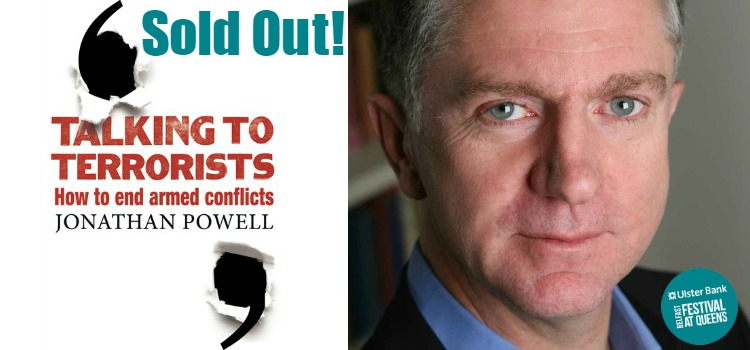Following the launch of his new book ‘Talking to Terrorists,” former Chief of Staff to Prime Minister, Tony Blair, Jonathan Powell, writes exclusively for Slugger about the lessions he learned from his time working on the Northern Ireland peace process
The Northern Ireland negotiations were the most difficult and frustrating challenge I faced in my life, but also, at least in retrospect, my most important and satisfying achievement. Since leaving government I have set up an NGO, Inter Mediate, to see if I can apply some of the lessons I learned there to conflicts elsewhere in the world.
There is of course no Northern Ireland model that can just be picked up and applied elsewhere. All conflicts are different, their causes are different and their solutions will be different. But I find when I bring delegations to Belfast to meet the different parties they do learn something that helps them resolve their conflicts back at home. At the very least they can learn from the mistakes we made.
I have now looked at armed conflicts over the last thirty years and their peace processes – those that succeeded like South Africa and El Salvador and those that failed like Sri Lanka and Colombia. It turns out there are common patterns to what works and what does not. Here are five lessons derived from Northern Ireland but backed up by experience elsewhere.
The first is that if the armed group has real political support there is no military solution to the conflict. Some revisionists now argue that talking got in the way of a military solution in Northern Ireland and that if the politicians had just stood back and left it to the security forces they could have defeated the IRA. That is a delusion in Northern Ireland as elsewhere. The French and Spanish security forces may well have succeeded in arresting successive ETA leaderships but they never succeed in finishing them off. It was negotiating that resulted in an end to the armed conflict in Spain in 2011 not fighting.
The second is that democratic governments find it hard to be seen to be talking to terrorists who are killing innocent civilians and therefore tend to start the contacts secretly. In Northern Ireland British intelligence established a link to the IRA through Brendan Duddy in the early 1970s which remained in place throughout the Troubles and was used for the correspondence between John Major and Martin McGuinness that led to the 1994 IRA ceasefire. In South Africa it was the NIS that made the first contacts with Nelson Mandela in jail and later opened talks with the ANC in exile in Switzerland.
The third is that governments initially resist the introduction of a third party into the talks but having such an independent referee makes it much easier to reach a settlement. The British government long opposed foreign interference in Northern Ireland but eventually accepted US Senator George Mitchell as chair of the talks. Without his patience and good humour we would not have secured the Good Friday Agreement. In El Salvador repeated bilateral attempts to resolve the bloody civil war between the FMLN guerrillas and the government failed and it was only when the UN special representative Alvaro de Soto came on the scene that it was possible to reach agreement.
The fourth is that it is not always the right time for negotiations to succeed. Certain conditions need to be in place. The first is a mutually hurting stalemate – both sides need to understand that they cannot win militarily. In El Salvador success only became possible in 1990 when the guerrillas launched ‘the final offensive’ on the capital San Salvador. They were not able to capture the whole city, let alone hang on to it, but they humiliated the army sufficiently that both sides realised they could not win by military means. The second condition is leadership. Tony Blair suggests in his autobiography that I accused him of having a ‘Messiah complex’. In fact it was Mo Mowlam who said Tony thought he was ‘f..ing Jesus’, which is not the same thing. But if Tony had not had the conviction that Northern Ireland could be solved and that he could do it, it would not have been resolved.
The last is that you have to escape the zero sum game if you want a lasting peace, which Gerry Adams and Ian Paisley finally came to understand in 2005. The classic example was Nelson Mandela who realised that he had to carry white South Africans with him not just his own constituency. When I said this in Spain about the conflict with ETA, the right wing Spanish press were appalled. They said the government had to be the winner and ETA had to be the losers. But if you insist on this there can be no enduring settlement – there can be no winners and no losers.
Above all we shouldn’t expect to get to peace in one go. Seamus Mallon described the Good Friday Agreement as ‘Sunningdale for slow learners’. Peace here was built on a series of failures as it is elsewhere. And even when you get to an agreement there is much to do. Peace building is every bit as hard as peace making, and that is what Northern Ireland is going through now.
Jonathan Powell’s Talking to Terrorists How to End Armed Conflicts is published by Bodley Head. He will be speaking at the Belfast Festival at Queen’s University on Saturday 18 October.
This is a guest slot to give a platform for new writers either as a one off, or a prelude to becoming part of the regular Slugger team.
Discover more from Slugger O'Toole
Subscribe to get the latest posts to your email.
